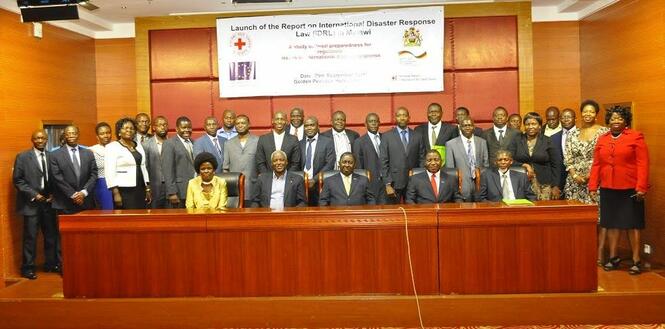
Malawi Red Cross, a key national humanitarian organisation active for more than 90 years, is at the forefront of disaster risk management in Malawi. Seeing the impact of frequent disasters, Red Cross knew a strengthened disaster risk management system to better facilitate the flow of international assistance would help keep communities safe and save lives.
Through its auxiliary role with the Government, Malawi Red Cross advocated for review of the legal framework for international disaster response in 2013.
María Martínez, IFRC Disaster Law’s Coordinator for Africa, says the positioning and relationship Malawi Red Cross has with the Government through its auxiliary role has been invaluable to the legal review process.
“A strong legal and policy framework is critical to reduce disasters and climate risks and build sustainable resilience. Through this law revision process, Malawi Red Cross is contributing to the enhancement of the country’s risk governance. Importantly, the whole process - the knowledge and decisions are with local actors, from Red Cross to government to civil society and community.”
The first stage of the project was a study to map and analyse Malawi’s legal framework for disaster risk management. Malawi Red Cross, with the support from IFRC Disaster Law, then led an international disaster response laws, rules and principles project alongside the Malawi Department of Disaster Management Affairs, which included extensive government, civil society and community engagement. The Guidelines for the Domestic Facilitation and Regulation of International Disaster Relief and Initial Recovery Assistance (IDRL Guidelines) were used as a benchmark throughout this process.
The project culminated in a report, Legal Preparedness for Regulatory Issues in International Disaster Response, recommending regulations to guide national authorities in requesting, vetting and accepting international humanitarian assistance and clearly outlining the role of the Malawi Red Cross in disaster risk management.
Malawi Red Cross, a national expert on disaster law, further advocated with the government to provide technical support to implement the IDRL report recommendations, and was entrusted by the Government to review the recommendations and support the revision of the Disaster Preparedness Relief Act of 1991.
The revision included provisions on how to request and use international assistance as well as the obligations that have been placed on international actors operating in Malawi. The draft Operations Guidelines were developed as an addendum, to provide regulation on the receipt and coordination of international assistance, responsibilities of assisting international actors, processes involved in the initiation and termination of International Disaster Relief and Initial Recovery Assistance, as well as the legal facilities available for the entry of personnel, goods and equipment, and their use during operations.
Prisca Chisala, Malawi Red Cross, Director of Programmes and Development says the incorporation of the IDRL provisions into the draft Bill will help the right help get to the people that need it most.
“A clear set of rules and procedures will guarantee that the appropriate aid is timely received and reaches the population in need. It will also facilitate coordination between national and international stakeholders and will enhance the localisation of aid.”
Legislation and policy processes can take significant time to develop and implement, while the draft Disaster Risk Management Bill awaits approval from Parliament, the learnings and awareness of the role and importance of disaster law have been widely felt in Malawi.